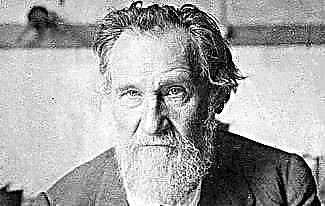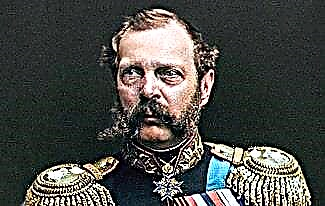Mark Tullius Cicero (106 BC. Thanks to his oratorical talent, he made a brilliant career (he came from an ordinary family), entering the Senate and becoming a consul. He was one of the brightest supporters of maintaining the republican system, for which he paid with his life.
Cicero left a vast literary heritage, a significant part of which has survived to this day. Already in the ancient era, his works received a reputation as standard in terms of style, and now they are the most important source of information about all aspects of the life of Rome in the 1st century BC. e. 
Cicero's numerous letters became the basis for European epistolary culture; his speeches, especially the Catilinaries, are among the most outstanding examples of the genre. The philosophical treatises of Cicero represent a uniquely comprehensive exposition of all ancient Greek philosophy, intended for Latin-speaking readers, and in this sense they played an important role in the history of ancient Roman culture.
There are many interesting facts in the biography of Cicero, which we will talk about in this article.
So, before you is a short biography of Mark Tullius Cicero.
Biography of Cicero
Cicero was born on January 3, 106 BC. in the ancient Roman city of Arpinum. He grew up and was brought up in the family of the horseman Mark Tullius Cicero and his wife Helvia, who had a good background.
When Cicero was about 15 years old, he and his family moved to Rome, where they could get a good education. Aspiring to become a judicial orator, he studied Greek poetry and literature with great interest, and also studied rhetoric from prominent orators.
Later, Mark studied Roman law, perfectly mastered the Greek language and got acquainted with various philosophical concepts. It is worth noting that he was fond of dialectics - the art of argument.
For a time, Cicero served in the army of Lucius Cornelius Sulla. However, he later returned to the study of various sciences, not experiencing much interest in military affairs.
Literature and philosophy
First of all, Mark Tullius Cicero showed himself as a first-class orator, thanks to which he earned great respect from his compatriots. For this reason, he published many works, one way or another related to eloquence.
In his writings, Cicero gave practical advice on how to deliver speeches in front of an audience and skillfully express his own thoughts. Similar topics were revealed in such works as "The Orator", "On the Construction of Speech", "On Finding the Material" and other works.
Cicero introduced many new ideas aimed at the development of rhetoric. According to him, a good orator needs to be able not only to speak beautifully in front of the public, but also to have a great store of knowledge, studying history, philosophy and jurisprudence.
It is also important for the speaker to maintain a sense of tact and to have contact with the audience. At the same time, consistency is very important, which is one of the main components of oratory. In the event that a rhetorician uses new or little-known concepts, he must use them in such a way that they are clear even for ordinary people. There is nothing wrong with using metaphors, but they should be natural.

Another important factor for the orator, Cicero called the ability to pronounce words and phrases correctly and clearly. Speeches before politicians or judges should be structured. For example, using jokes may not help convey your message, but in some circumstances will make your speech more natural.
The rhetorician must “feel” the audience, making full use of his talent and accumulated knowledge. Cicero advised not to start speaking on an emotional upsurge. On the contrary, emotions are best left at the end of the performance. This is how you can achieve the best result.
Mark Tullius Cicero recommended that everyone read as many works as possible. Thanks to this, a person receives not only knowledge, but also increases the level of mastery of the word.
An interesting fact is that Cicero called history not a science, but a kind of oratory. In his opinion, the analysis of past events is not so important. The traditional listing of historical events does not arouse the interest of the reader, since it is much more fun for him to learn about the reasons that prompted people to take certain actions.
Political Views
Cicero's biographers note his significant contribution to the theory of state and law. He argued that every official must study philosophy without fail.
Performing in front of the public became a habit for Cicero already at the age of 25. His first speech was dedicated to the dictator Sulla. Despite the danger of judgment, the Roman government did not pursue the speaker.
Over time, Mark Tullius Cicero settled in Athens, where he explored various sciences with great zeal. Only after the death of Sulla did he return to Rome. Here, many begin to invite him as a lawyer in court proceedings.
Greek thoughts were at the head of Cicero's political views. At the same time, Roman law was much more acceptable to him. In his work "On the State", the philosopher argued that the state belongs to the people.

According to the man, the Roman Republic needed a ruler who could peacefully resolve the contradictions that arose among the people. He reacted negatively to the form of power introduced by Octavian Augustus. The philosopher was a supporter of the republican system, the ideas of which were contrary to the princeps.
By the way, the princeps in the Roman Republic meant senators who were listed first in the Senate list and the first to vote. Starting with Octavian, the title "Princeps of the Senate" denoted the bearer of sole power - the emperor.
The concept of a supra-class leader still provokes heated discussions among political scientists. For many years of his biography, Cicero was in search of ideal laws aimed at preserving the state. He believed that the development of the country occurs in two ways - dies or develops.
For a state to flourish, an ideal legal framework is needed. In his work "On the Laws" Cicero presented in detail the theory of natural law.
Both people and gods are equal before the law. Mark Tullius considered jurisprudence a difficult science that even judicial rhetoricians could not master. For laws to begin to resemble art, their authors must use the philosophy and theories of civil law.
Cicero said that there is no justice in the world, and that after death, each person will be responsible for their actions. An interesting fact is that the speaker did not advise to adhere to the law exactly, since this inevitably leads to injustice.
Such views prompted Cicero to demand fair treatment for slaves, no different from hired workers. After the death of Caesar, he presented the dialogue "On Friendship" and the work "On Responsibilities."
In these works, the philosopher shared his thoughts on the fall of the republican system in Rome. Many of Cicero's phrases were parsed into quotations.
Personal life
Cicero was married twice. His first wife was a girl named Terence. In this union, the couple had a girl Tullia and a boy Mark. Having lived together for about 30 years, the couple decided to leave.
After that, the orator remarried the young Publius. The girl was so in love with Cicero that she was even jealous of him for her stepdaughter. However, this marriage soon fell apart.
Death
After the assassination of Julius Caesar, the philosopher found himself on the proscription lists for his regular attacks on Mark Antony. As a result, he was recognized as an enemy of the people, and all his property was confiscated.
In addition, a reward was announced for the murder or extradition to the government of Cicero. The orator tried to flee, but did not have time. Mark Tullius Cicero was killed on December 7, 43, at the age of 63.
The assassins caught up with the thinker not far from his estate in Formia. Seeing the people pursuing him, the man ordered the slaves to put the palanquin on the ground, inside which he was. After that, Cicero stuck his head out from under the curtain and prepared his neck for the sword of the pursuers.
It is curious that the severed head and hands of the philosopher were taken to Antony, and then placed on the platform of the forum.
Photo of Cicero


















